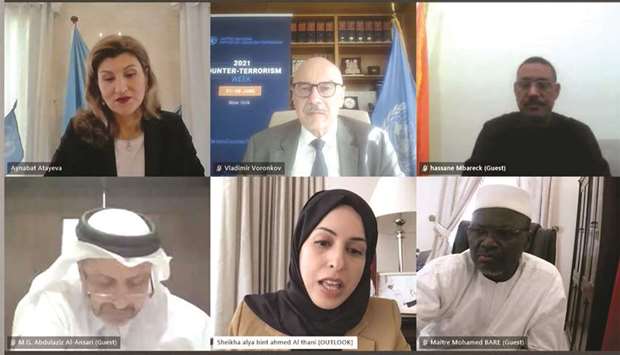A high-level side event on Thursday, which forms part of the Second Counter-Terrorism Week, underlined the importance of adopting innovative methods and digital technologies in fighting terrorism.
The virtual conference, co-organised by the United Nations Office of Counter-Terrorism (UNOCT), through its Programme Office in Doha, ‘International Hub on Behavioural Insights to Counter Terrorism’, and the State of Qatar, also discussed the role of behavioural insights in confronting new and evolving threats.
Speaking at the event, Major General Abdul Aziz Abdullah al-Ansari, director of the Department of International Co-operation and chairman of Ministry of Interior’s National Counter-Terrorism Committee, said: “We truly believe that countering terrorism is a multifaceted challenge. For counter-terrorism to be successful, we first need to build deep understanding of the factors that contribute to people resorting to violent extremisms and terrorism.”
“This is what drives the State of Qatar to believe in behavioural science as a great tool in this regard. We recognise the multidimensional nature of the terrorist threats and the major interventions needed to eliminate it,” he noted.
Al-Ansari stressed that Qatar government, which closely works with UNOCT, aspires to use all tools at its disposal especially the new technologies and science to counter terrorism.
He said the Doha hub is now operational and forging ahead with its mission to facilitate research and developing field of behavioural insights to counter terrorism and to provide capacity building assistance, as well as share knowledge and lessons learned.
Al-Ansari pointed out that counter-terrorism requires developing research, sharing knowledge, and best practices.
“These are all functions of the hub in order for it to be impactful,” he said, adding that co-operation with various stakeholders within and outside the UN is essential.
“I would like to reaffirm our support for the International Hub on Behavioural Insights for Counter-Terrorism and we are confident it will go on to become a centre of excellence at the global level,” al-Ansari said.
Under-Secretary-General for Counter-Terrorism, Vladimir Voronkov, highlighted that the International Hub on Behavioural Insights to Counter Terrorism uses cutting-edge and evidence-based techniques to identify how humans think, decide and act in the context of terrorism.
“It then uses that knowledge to develop human rights-compliant interventions, lead the collaborative production of research, and provide practical solutions through behavioural tools to address drivers,” he said.
He noted that UN entities, member states, regional organisations and civil society will be able to leverage the hub’s work on diverse topics such as education, strategic messaging, rehabilitation and reintegration, youth engagement, promoting gender equality, fostering social inclusion, and building community resilience.
HE Sheikha Alya bint Ahmed al-Thani, Permanent Representative of the State of Qatar to the UN, said “Qatar fulfilled its commitment to bring the Doha hub to light and today, is the inception of that promising project, together with UNOCT and providing the required support for it.”
“The State of Qatar undertook the initiative to host the International Hub in line with its recognition of the need to harness all tools available in the fight against terrorism and violent extremism, especially innovative methods and emerging disciplines.
“This commitment did not end with the opening of the hub in Doha. Now, we are glad to see the International Hub delivering on its envisioned mission. It is also noteworthy how the utility of behavioural science is gaining more recognition not just for counter-terrorism but as well for preventing violent extremism and this is the uniqueness of the Doha hub.”
The event was also attended by Mohamed Rafiuddin Shah, chief of the Policy, Knowledge Management and Coordination Branch, UNOCT; Dr Fadi Makki, founder of Nudge Lebanon and head of B4Development at the Qatar Supreme Committee for Delivery and Legacy; Dr Jessica White, research fellow in the Royal United Services Institute Terrorism and Conflict Group; Dr Kurt Braddock, assistant professor of Public Communication, School of Communication, American University in Washington, DC, SOC's Centre for Media and Social Impact, Centre for University Excellence's Polarisation and Extremism Research and Innovation Lab; and Dr Simbal Khan, United Nations Development Programme in Preventing Violent Extremism expert.


